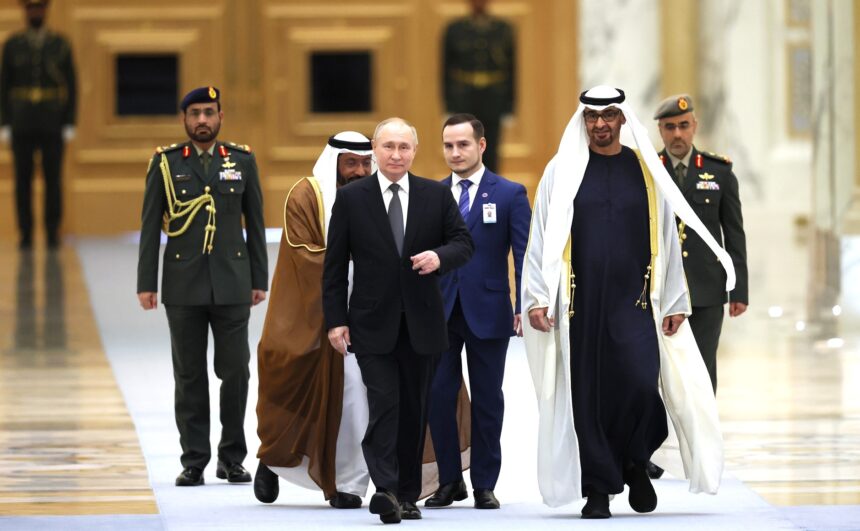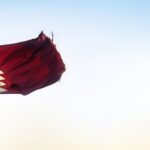Summary by Geopolist | Istanbul Center for Geopolitics:
The UAE’s investments in Russia are increasing, highlighting growing bilateral ties. This trend reflects strategic economic and political cooperation, with the UAE investing in various Russian sectors such as energy, infrastructure, and technology. These investments aim to enhance mutual economic benefits and strengthen geopolitical alliances. The relationship is further solidified by high-level meetings and agreements that emphasize collaboration and shared interests between the two nations.
Read the full article below.
Historically, the United Arab Emirates (UAE) and Russia shared a relatively modest relationship, characterised by limited economic interactions and cautious political engagement. However, the past two decades have seen a notable shift, with the two countries recognising mutual benefits in closer cooperation both in the economic and geo-strategic domain. Economically, for the UAE, this transformation occurred within the context of a broader international strategy initiated in the early 2000s. This strategy focused on diversifying the country’s economy away from oil and seeking new opportunities in emerging markets: Russia was one of these. For Russia, the UAE represented a strategic location as a trading hub in between Europe, Asia and Africa, and facilitating its access to Middle Eastern markets. Since the late 1990s, Moscow began to cement its partnership with the Arab country: Russian exports to the Emirates gained significant momentum, and a growing Russian diaspora emerged especially in cities like Dubai and Abu Dhabi, comprising business professionals, skilled workers, and entrepreneurs who were attracted by these cities’ dynamic economy and investment opportunities.
In more recent years, the relationship between the two countries has reached another level, marked by deep economic, political, and strategic ties. Against this backdrop, while seeking a greater international role – including in the Asian continent – the UAE has significantly ramped up its investments in Russia (particularly in sectors like energy, infrastructure, real estate, and technology) and strategic dialogue with Moscow. At the same time, and particularly since Russia’s invasion of Ukraine in February 2022, the UAE has emerged as a critical partner for Russia. What is the UAE up to in Russia, and what is Russia up to in the UAE? What are the main drivers, features, and prospects of this growing partnership?
The drivers of the UAE’s investment to Russia
The primary drivers of UAE investments in Russia have been the pursuit of a diversified economic portfolio, aligning with the country’s strategy to increase diversification across both economic sectors and international partners. The UAE’s sovereign wealth funds (SWFs), including Mubadala Investment Company and the Abu Dhabi Investment Authority (ADIA), have been at the forefront of this initiative. These entities have made substantial investments in various Russian sectors, including energy, technology, infrastructure, and agriculture.
In the energy sector, particularly oil and gas, the UAE’s investments in Russian projects have been significant. Already in 2013, Mubadala has established a co-investment programme with the Russian Direct Investment Fund (RDIF), aimed at co-investing in projects such as the development of oil fields in Siberia and the construction of a high-tech innovation center in Skolkovo. Additionally, Mubadala has taken a substantial stake in several Russian energy companies, including a notable investment in Gazprom Neft in 2020. Another significant investment by Mubadala is in the development of the Arctic LNG 2 project, a large liquefied natural gas (LNG) initiative that enhances Russia’s LNG production and export capabilities.
Another area of interest is technology and innovation. Over the past few years, the UAE has been particularly keen on developing its tech industry, and Russia’s advanced technological capabilities have presented a good partnership opportunity. For example, Mubadala has partnered with the RDIF to invest in promising Russian tech companies, such as Yandex, one of Russia’s largest technology companies known for its internet-related services. Additionally, there has been a focus on artificial intelligence and machine learning, with investments in Skolkovo Innovation Center, which is known for its tech incubators and research facilities. Another notable collaboration is in the field of space exploration, where the UAE and Russia have signed inter-governmental agreements to work together on space missions and satellite technologies (2021), leveraging Russia’s extensive experience in space research and the UAE’s ambitious space program.
Investments in infrastructure and logistics have also been pivotal in strengthening UAE-Russia economic relations. The UAE has invested significantly in Russia’s transportation and logistics sectors, aiming to enhance trade routes between the two countries and beyond. For instance, already in 2016, DP World, a leading UAE-based global port operator, has entered a joint venture with the RDIF to develop port terminals and logistics infrastructure in key locations in Russia, such as the Baltic and Far Eastern regions, which are crucial for connecting the country to global market routes. In 2023, DP World has also signed an agreement with Russia’s state-owned Rosatom to develop the Northern Transit Corridor. Such partnership aims to create a sustainable shipping route between Asia and Europe via the Arctic, significantly reducing transit times and environmental impacts. This route, also known as the Northern Sea Route (NSR), could cut up to 19 days off the sailing time between Southeast Asia and Northwest Europe compared to traditional routes.
Emirati companies have also contributed to the modernisation of Russia’s agricultural sector, which has become an increasingly important area of cooperation between the two countries. Russia, with its vast arable land, is a major agricultural producer, and the UAE’s investments in this sector aim to secure food supplies for its population and promote agricultural technology exchanges. ADIA (Abu Dhabi Investment Authority), for instance, has financed large-scale farming and food production projects in Russia. The focus on agribusiness has resulted in increased agricultural exports from Russia to the UAE, including essential commodities such as wheat, barley, legumes, and poultry meat.
Russian interests in the UAE
All these investments and joint ventures prove the UAE’s interest in partnering with Russia across a variety of domains and through a variety of modalities. On their side, Russian businesses have increased their presence in the UAE, benefiting from its status as a global trade and financial hub. This development has become starkly evident in the two years following Russia’s invasion of Ukraine (2022-2024). Russian exports to the UAE have almost doubled, with trade values rising from $4.61 billion in 2021 to $8.07 billion in 2022. In the run of a few months, this shift has brought the UAE to be Russia’s seventh global trade partner, following China, India, Turkey, Kazakhstan, Japan and South Korea; thus, also classifying the UAE as the first Arab country for Russian exports in goods and commodities.
Cultural and social exchanges have also played a role in strengthening UAE-Russia ties. Tourism in particular has seen remarkable growth, also thanks to the existence of direct flights and visa facilitation schemes, that have made travel more accessible. Between January and April 2023, Dubai is estimated to have welcomed 474,000 Russian tourists, making Russia one of the top sources of visitors. Educational collaborations have also flourished, with student exchange programs, joint research projects, and academic partnerships. Russian universities have welcomed Emirati students, while UAE institutions have hosted Russian scholars, fostering academic and cultural ties. The opening of an UAE lecture hall at Moscow’s MGIMO University in 2023 (whose ceremony was attended by Minister Lavrov) and the Plekhanov University holding an Open Day event at the Dubai Knowledge Park in 2024, are small signs of growing cooperation in this sector.
Most importantly, however, Russian business found especially in the UAE a ‘safe haven’ from Western sanctions. Many Russian banks have transferred their funds to the UAE to protect them from potential seizures and to continue operations without the constraints imposed by European regulations. Russian investments especially in Dubai’s real estate market increased dramatically, with Russians spending around $6.3 billion on properties in 2022, making them the top non-resident buyers of residential real estate in the Emirate. Such investments also facilitated the relocation of many Russians – mainly oligarchs and wealthy citizens – to the country. Emirati ports and harbours have also welcomed luxury yachts and private planes belonging to some of the most famous Russian oligarchs, many of whom are under sanctions. The UAE’s welcoming policies, designed to attract wealthy foreign investors from all over the world, have been especially appealing to Russians, offering practical solutions for fleeing their country while allowing them to continue their business activities undisturbed.
The political side of the growing UAE-Russia partnership
Looking ahead, the future of UAE-Russia ties appears promising. The continued diversification of the UAE’s investment portfolio, coupled with Russia’s need to cement non-Western partnerships, sets the stage for sustained growth of bilateral ties. This is all the more true as, beyond economic interests, broader political consideration very much nurtures the UAE-Russia partnership. Over the past few years, especially since Russia’s invasion of Ukraine, the two countries have shared common views concerning security developments both in the MENA region and in global affairs. They have aligned their approaches to various regional conflicts, such as those in Libya and Syria, and have coordinated on diplomatic initiatives. Their collaboration extended to defense, counter-terrorism efforts, and regulation of global oil markets. The two countries have come together in different international forums, where they have demonstrated to often share similar visions on key global issues (mainly the Shanghai Cooperation Organization – where the UAE has been granted Dialogue Partner status in 2023 – and the BRICS’ bloc, where the UAE was officially admitted, alongside Saudi Arabia, in January 2024. The inclusion of the UAE in such multilateral forums, where Russia is a major partner, is particularly emblematic of this deepening alliance. These forum’s enlargement does not only bolster UAE-Russia ties but reflects a mutual interest in fostering economic and political collaborations outside Western-dominated frameworks. Indeed, it is no coincidence that the dynamics of the Russia-UAE relationship has come under increased international scrutiny.
By: Chiara Lovotti
Source: ISPI







